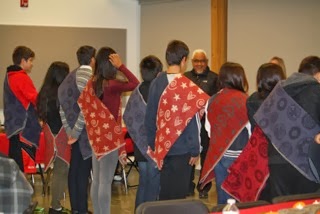Spirit: How do we ensure Aboriginal learners are successful through the full effort of SD 68 Nanaimo-Ladysmith and Aboriginal communities in supporting the Enhancement Agreement?
Body: How do we enhance all students’ and all adults’ understanding of Aboriginal history, perspectives, and people respecting that there is a contemporary context?
Emotion: How do we enhance Aboriginal students’ sense of belonging within schools and their belief that they can be successful in SD 68 while at the same time enhancing the belief of the system that Aboriginal students can be more successful?
 After engaging in the ‘scanning’ phase of the inquiry cycle –
addressing what is really going on for learners, not just from the perspective
of professionals but from student and family perspectives as well – they recognized
that students, parents and staff had mentioned that they wished to see a higher
and more visible presence of the Aboriginal connections in the school,
specifically at the entrance to the school to make visitors more welcome. This was echoed by the local Snuneymuxw community
education representatives, who noted that sometimes parents felt anxious
approaching the school on their own.
After engaging in the ‘scanning’ phase of the inquiry cycle –
addressing what is really going on for learners, not just from the perspective
of professionals but from student and family perspectives as well – they recognized
that students, parents and staff had mentioned that they wished to see a higher
and more visible presence of the Aboriginal connections in the school,
specifically at the entrance to the school to make visitors more welcome. This was echoed by the local Snuneymuxw community
education representatives, who noted that sometimes parents felt anxious
approaching the school on their own.After surveying the school population about the proposed project, and recognizing that one third of the population are of Aboriginal heritage from diverse communities including Snuneymuxw, the Metis, and communities from all over BC and the north, a group of students and artist mentors were supported to paint the large concrete pillars outside the school. Once painted, these pillars would serve as Welcome Poles representing the broad range of Aboriginal students’ backgrounds.
By the end of the 2012 – 2013 school year, two of the four Welcome Poles had been completed, and were unveiled on the last day of school. Since then, two more poles featuring Aboriginal student designs have been completed, and the school celebrated with a formal blessing ceremony this past December.
As with any inquiry project, the Barsby team noted rich and valuable learning points from engaging in the process, both how the school was excelling in recognizing Aboriginal heritage and community, as well as identifying misunderstandings and misrepresentations that they could then address as they progressed through their learning. We encourage you to read their full case study of the experience to learn more. Congratulations to the inquiry team at John Barsby Secondary School for being committed to enhancing the learning of all students in your community.






